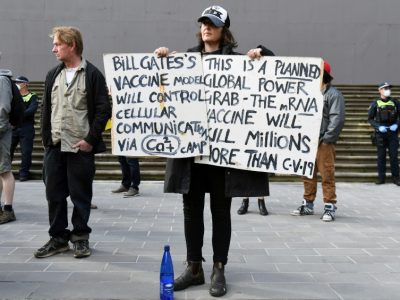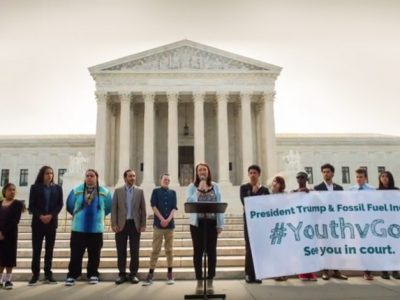General
Surprise! Major Land Conservation Bill Poised to Pass Congress
Republican-Led Senate Prepared to Preserve Public Lands–and Political Careers?
Over the past decade, we’ve become resigned to the sad fact of congressional gridlock: a hopelessly partisan and paralyzed Congress, seemingly unable to pass major legislation on the environmental protection, natural resource conservation or, indeed, any number of other policy fronts. So it has to come as a shock to most observers that this week …
Continue reading “Surprise! Major Land Conservation Bill Poised to Pass Congress”
CONTINUE READING(Still More) Bad News on the Doorstep
New Reports Document Accelerating Wildlife Extinctions, Global Deforestation Trends
While public attention in recent weeks and months has understandably focused on the COVID-19 pandemic and the racial justice shockwaves triggered by George Floyd’s tragic death, another disaster continues apace. This week the New York Times published two alarming stories documenting the accelerating decline of our global environment. The first, entitled “Extinctions Are Accelerating, Threatening …
Continue reading “(Still More) Bad News on the Doorstep”
CONTINUE READINGWe All Have a Role in This Fight
Those who fight for the environment must fight for racial justice, as well.
All people have a moral obligation to express outrage about the disgraceful violence against African Americans and about the systemic racism that feeds it. Even more so if one considers oneself to be an environmentalist. A key component of an ecological perspective is an understanding of the interconnection of all living things. Violence against some …
Continue reading “We All Have a Role in This Fight”
CONTINUE READINGLemonade
Can the COVID Crisis Benefit Climate Response?
Former Obama chief of staff and Chicago Mayor Rahm Emmanuel has been cited quite a bit for this quote: You never let a serious crisis go to waste. And what I mean by that it’s an opportunity to do things you think you could not do before. COVID-19 certainly meets the criteria of a serious …
CONTINUE READINGNinth Circuit Hands California Local Governments Big Climate Change Win
Local Governments’ Climate Change Lawsuits Against Big Energy Belong in State Courts, Court of Appeals Rules
Today the U.S. Court of Appeals for the Ninth Circuit handed numerous California local governments a major win over major oil, gas and coal companies in several of the nation’s most consequential set of climate change lawsuits. The Ninth Circuit did so in two separate opinions; County of San Mateo v. Chevron Corporation and City of …
Continue reading “Ninth Circuit Hands California Local Governments Big Climate Change Win”
CONTINUE READINGDay In/Day Out, Our Continuing Troubles
Some things are episodic. Others just go on and on. And on.
You might think a massive disease outbreak or skyrocketing unemployment would make our other troubles come to a halt or at least slow down. But no, not so much. Here are a dozen examples of things that refuse to stop, regardless of the day of the week, the presence of an epidemic, or a collapsing …
Continue reading “Day In/Day Out, Our Continuing Troubles”
CONTINUE READINGNetworks of Misinformation
How Anti-Public Health Messages and Activities Spread
Like a virus, misinformation can spread within a population. It has its super-spreaders, just like the coronavirus. It can mutate in ways that make it more contagious. And it can be weaponized. Research into networks of coronavirus-related communication has revealed how both true and false information spread through social media . Misinformation can spread like …
Continue reading “Networks of Misinformation”
CONTINUE READINGGuest Contributors Rosa Hayes and Samantha Peltz: Silver Linings in the 9th Circuit’s Juliana Decision
Juliana Litigation Provides Clues for Establishing Standing in Future Cases
For many aspiring environmental litigators, such as ourselves, the bold Juliana litigation was the little-case-that-could: it presented a novel constitutional theory to redress the climate crisis, survived a motion to dismiss against all odds, and went up to the Supreme Court not once, but twice. But on January 17, 2020, Juliana hit a significant roadblock …
CONTINUE READINGWhat Are The Benefits Of Phasing Out California’s Oil & Gas Production?
Emissions should decrease but multiple factors complicate any predictions
It might seem obvious that phasing out oil and gas production in California would benefit the climate. But the reality is much more complicated, in terms of emissions, economics and even geopolitics. CLEE just released the report Legal Grounds with policy options to reduce in-state production, but the question of how much a phase out …
Continue reading “What Are The Benefits Of Phasing Out California’s Oil & Gas Production?”
CONTINUE READINGDo Epidemic-Based Business Closures by Government Trigger an Unconstitutional “Taking”?
Longstanding U.S. Supreme Court Precedents Indicate the Answer is an Unequivocal “No”
Lately, an increasing number of public and private voices have been raised in opposition to business closures ordered by state and local governments in response to the COVID-19 epidemic. In many such cases, that opposition has taken the form of lawsuits filed by business owners, claiming a violation of their constitutional rights. Gun shops across …
CONTINUE READING











